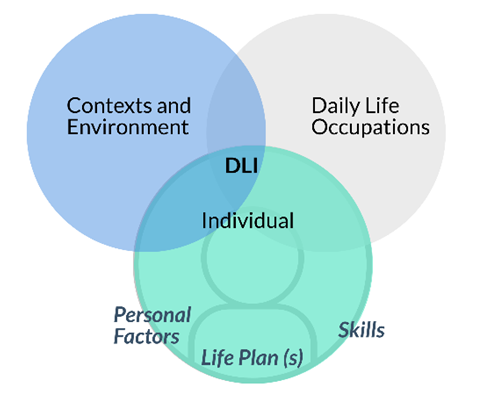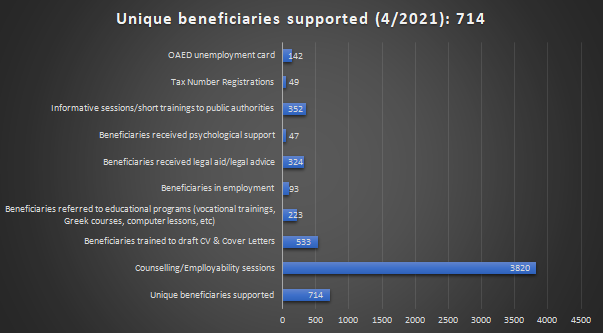Integration Service
The integration of asylum seekers and recognized refugees is a complex process affected by factors such as language competence, education, housing concerns, and reception from the host community.
The main challenges faced by asylum seekers and recognized refugees are the difficulty in issuing the necessary legal and administrative documents and in using them, the risk of homelessness, the absence of public support programs, the lack of sufficient number of education centres for Greek language acquisition or/and higher education programs, -run by Civil Society Organisations- as well as the obstacles in access to continuing professional development.
Moreover, the lack of access to the labour market, the difficulty in understanding and approval of different cultural backgrounds and the absence of relations between refugees and locals lead to the marginalization of the former, which affects both their employment opportunities and consequently the reassurance for a decent standard of living.
Special focus should be given to 18-21 years-old- young people, who are alone in Greece and struggle to cope with survival issues, as well as to access to supportive services, without their family network.
Last but not least, the Far-Right rhetoric, xenophobia and racism by employers or/and staff, property owners etc., jeopardize the smooth coexistence and integration of refugees to the local community.

WHAT WE SHOULD NOT FORGET
- Access to employment, social support and healthcare is still hindered due to lack of ProvisionalSocial Security and Health Care Number and several difficulties relevant to public services’ operation. Additionally, several gaps have occurred due to the frequent changes of the regulations and decisions.
- The COVID-19 restrictions and the transit of recognised refugees from the islands to the mainland without any temporary accomondation plan or sufficient places of living, often result in insecure housing or homelessness.
- Besides accommodation, access to basic goods, health and safety is not guaranteed for all asylum seekers.
- Social inclusion and co-existence are related to both objective conditions (e.g. housing, work, income) and subjective experience (sense of being friendly, interaction with the local community and sense of belonging).
- Within the vulnerable group of the refugee population, there are smaller vulnerable groups such as people with disabilities, survivors of gender-based violence, torture and human trafficking, people with mental health problems, etc.
METHODOLOGY
Daily Life Integration (DLI) is considered as the result of a set of factors that interact. In order for the Integration Service to create the Individual Integration Plan, for each beneficiary, the necessary information is collected through the social history intake. The axes of intervention are individualized to each beneficiary, according to the challenges and difficulties they face and are summarized in the following:
- Support in administrative matters (taxation, social welfare / social benefits)
- Recording of atypical and formal skills
- Continuing education (access to education system, vocational training, language courses)
- Access to the labor market (counselling, capacity building)
- Psychosocial support – Access to city life (group sessions, individual support for participation in events in the city, expansion of the network)
- Legal support and counselling aiming at integration
Target Group: Vulnerable persons or/and persons without legal documentation in Greece and without any prospect of return to their country of origin, who are under detention or at risk to be detained. This group includes the newcomers, who have no access to international protection for pro longed periods and the persons who have no legal documentation for a long period and still reside in the community, having exhausted the possibility to be recognized as refugees.
CHALLENGES
During the last years, the migration population has faced multiple challenges through its integration process and in many cases may face obstacles in gaining a solid legal status until final integration or final rejection of its application. During this period, this population lives in precarious conditions with the risk of being detained and for long periods of time. Even today, many detainees remain in police stations for months – up to 6 – under completely inappropriate conditions and without access to basic rights. The constant legislative amendments on the administrative detention of third-country nationals, with the view of return, have clearly shown that the existing policy line is based on the general imposition of administrative detention indiscriminately as a deterrent policy and namely in order to prevent new arrivals in the country, marginalizing human rights. Simultaneously, in the field of asylum seekers’ detention we have identified a significant increase as a result of the inadequate access to the asylum process for a prolonged period, putting this population in the risk of being under detention for a prolonged period or/and being push backed.
WHAT WE SHOULD NOT FORGET
Taking into consideration that the main purpose of administrative detention is the return to the countries of origin, therefore the deadlines provided by law are expected to be exhausted in most cases, the fact that the number of returns in 2020 remained extremely low raises even more concerns about the imposition of prolonged detention.The latter in conjunction with a) the amendment of the legislation in May 2020, according to which detention in persons with the view of return becomes the rule and alternatives to detention measures are applied only exceptionally andb) the provisions of the proposed Pact on Asylum and Migration which on the one hand provide the increase of administrative detention and returns without even temporarily regulating the legal status of persons without legal documentation, and on the other hand introduce the ” sponsorship return ” according to which the return procedures to their country of origin will be undertaken by the European State to which third country nationals will be transferred after that State has been reimbursed EUR 10,000 per person relocated in view of return, an amount significantly higher than the amount spent on the relocation of persons to other European countries, evidence that Europe’s priorities have also changed and the tolerance of all stakeholders in the deprivation of rights has been extended.
METHODOLOGY CASE MANAGEMENT APPROACH
Referrals from other organizations
Screening
Individual Assessment
Case Planning (livelihood, psychosocial and legal counselling-legal aid)
- Providing multiple empowerment and survival sessions.
- Proving legal counseling and aid to beneficiaries in order to mitigate the risk of being detained and to explore the possibly legal options throughout the migration system.
- Providing regular assistance and guidance to beneficiaries in order to meet even vital survival needs (housing, food, clothing, supermarket vouchers, access to organizations providing warm clothes during the winter, etc.) depending on their personal needs
- Supporting beneficiaries to continue their education and studies, and organizing employability sessions for the beneficiaries who do not have access to the labor market in order to improve their soft skills.
- Identifying opportunities for our beneficiaries, regardless of their legal status, to participate in online workshops and vocational trainings.
Referrals to specific services provided by other organizations
Establishing collaborations with other organizations
Follow up of the case
Interventions to authorities
| Numerous interventions and legal actions before the police authorities, detention centers and the Asylum Service, in order to reassure the access to the asylum process and the regularization of their legal status. |
Advocacy actions/ Strategic litigation
| Undertaking strategic legal cases and legal representation before courts |








